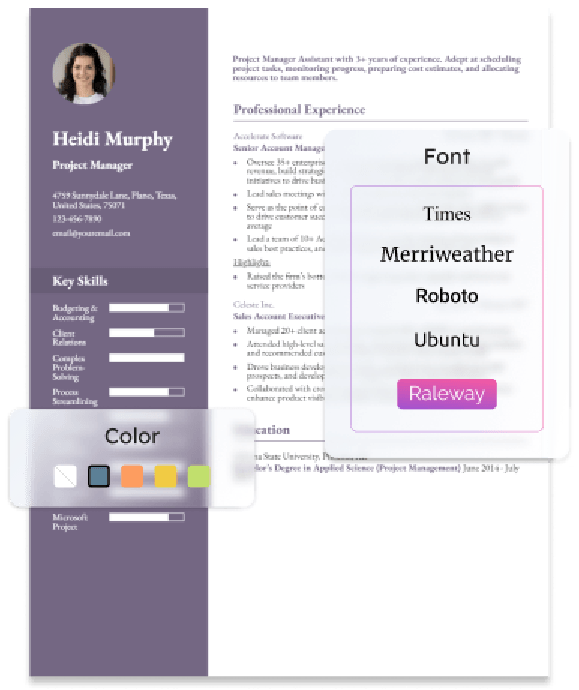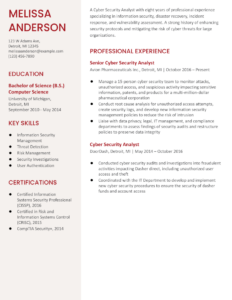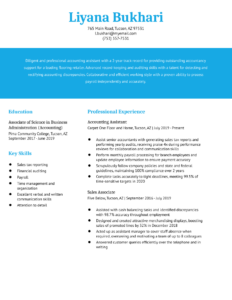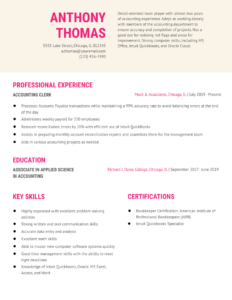How To Write an Entry-Level Financial Analyst Resume
To write a strong entry-level financial analyst resume, leverage the most compelling aspects of your academic projects, internships, and industry knowledge. Without an extensive work history, you’ll have to rely on your financial analysis skills and education to generate job interviews on the open market. Focus on incorporating qualifications that demonstrate your understanding of complex financial concepts. This guide provides expert tips and insights to help build an accomplishment-driven resume.
- Entry-level
- Mid-career
- Senior-level
1. Write a dynamic profile summarizing your entry-level financial analyst qualifications
Craft an engaging snapshot of your qualifications and experience to grab the hiring manager’s attention. Start with an opening sentence with your current title and three to four specializations that align with the job description. As an entry-level financial analyst, draw attention to any relevant experience you’ve garnered during an internship or your academic career. Send a strong message to prospective employers that you have the knowledge and skill sets to succeed. For example, if a company seeks a candidate who excels in business intelligence, you could highlight your ability to enhance financial reporting for data-driven decision-making.
Professional Profile - Example #1
A financial analyst with entry-level experience specializing in accounting, financial modeling, business intelligence, and data-driven decision-making. Adept at identifying opportunities to enhance financial reporting, and improve profitability for client businesses.
Professional Profile - Example #2
A financial analyst with entry-level experience specializing in economics, finance, financial modeling, and accounting principles. A proven track record of developing and refining financial reporting for small and medium-sized businesses across various market verticals.
2. Add a compelling section featuring your entry-level financial analyst experience
Craft a professional experience section that encapsulates strong accomplishments and experience you’ve garnered in your internships and entry-level jobs. Incorporate numbers, monetary figures, and metrics whenever possible to establish a sense of scope for your achievements and grab the attention of prospective employers. For example, if your financial analysis contributed to increased return on investment (ROI) or cost savings, feature these metrics prominently in your bullet points.
If you have no relevant internships or work experience, you can still demonstrate your financial knowledge and qualifications by featuring academic projects. Rather than simply listing the projects, craft detailed bullet points to show hiring managers the knowledge you’ve gained while pursuing your degree. Emphasize the type of analysis you performed or the financial models you created. Send a strong message that you’re worth hiring, even without years of hands-on professional experience.
Professional Experience - Example #1
Entry-Level Financial Analyst, SouthWest Financial Services Inc., Nashville, TN | May 2023 – present
- Analyze financial operations and reporting for five client accounts valued at $100,000 to $250,000, including operating expenses, vendor relationships, labor costs, and revenue cycle management
- Interface with client teams to evaluate financial reporting, analyze variance to actuals, perform forecasting, develop operating plans, and conduct headcount planning
- Develop financial models and strategies in coordination with senior financial analysts, including creating short-term and long-term financial plans based on key performance indicators (KPIs)
Professional Experience - Example #2
Entry-Level Financial Analyst, Coleman Financial Firm, New York, NY | May 2023 – present
- Perform comprehensive financial analysis on business financials, product use cases, and market indicators to inform investment decision-making for a premier financial firm
- Conduct due diligence on an investment in a startup food delivery service based on competitive analysis and cash flow, resulting in a potential ROI of up to 150%
- Coordinate with financial analysts and accounting teams to evaluate risk factors and conduct financial reporting on investment opportunities
3. Add entry-level financial analyst education and certifications
Showcase any relevant experience, coursework, and certifications to generate job interviews at the entry level. List your degree, college institution, and graduation date. Highlight academic achievements, such as awards or your GPA. Consider pursuing industry certifications to show prospective employers your strong foundational knowledge of finance. Your priority should be obtaining a Chartered Financial Analyst (CFA) credential from The Financial Industry Regulatory Authority (FINRA).
Education
Template
- [Degree Name]
- [School Name], [City, State Abbreviation] | [Graduation Year]
Example
- Bachelor of Science (B.S.) Economics
- Temple University, Philadelphia, PA | 2023
Certifications
Template
- [Certification Name], [Awarding Organization], [Completion Year]
Example
- Chartered Financial Analyst (CFA), FINRA, 2023
4. List key entry-level financial analyst skills and proficiencies
Showcase the relevant key skills that match the job description to achieve compliance with Applicant Tracking Systems (ATS). Employers utilize software algorithms to parse resumes for specific keywords from the job description. If your document lacks a sufficient number of key terms, your application will likely be rejected before it reaches the hiring manager. To mitigate this risk, tactically integrate a mix of financial analysis and industry terms into your profile, professional experience, and skills section.
Below are potential keywords you may encounter while applying for financial analyst positions.
| Key Skills and Proficiencies | |
|---|---|
| Accounting | Bloomberg |
| Budgeting | Business administration |
| Business intelligence | Client relations |
| Due diligence | Economics |
| Finance | Financial analysis |
| Financial modeling | Financial planning and analysis (FP&A) |
| Financial reporting | Financial strategy |
| Forecasting | Generally accepted accounting principles (GAAP) |
| Investment strategy | Mergers and acquisition (M&A) |
| Microsoft Excel | Microsoft Office Suite |
| Project management | Reconciliation |
| Risk management | System, Application, and Processing (SAP) |
| Statistical analysis | Variance |
How To Pick the Best Entry-Level Financial Analyst Resume Template
When selecting your resume template, avoid formats with multiple columns and flashy visual elements. A single-column template with limited color provides an organized, sequential reading experience without distracting the hiring manager from your content. Be sure to use a simple, elegant 11 or 12-point font, such as Cambria, Garamond, or Calibri. When in doubt, always prioritize structure and readability over aesthetics.
Entry-Level Financial Analyst Text-Only Resume Templates and Examples
- Example #1
- Example #2
- Example #3
Alicia Jameson
(123) 456-7890
[email protected]
123 Your Street, San Diego, CA12345
Profile
A Financial Analyst with entry-level experience specializing in investment strategy, market analysis, financial analysis, and risk management. Adept at coordinating with investors to evaluate ROI potential and risks for acquisitions and investment opportunities.
Professional Experience
Entry-Level Financial Analyst, Coleman Financial Firm, New York, NY
May 2021 – Present
- Perform comprehensive financial analysis on business financials, product use cases, and market indicators to inform investment decision making for a premier financial firm
- Conduct due diligence on an investment in a startup food delivery service based on competitive analysis and cash flow, resulting in a potential ROI of up to 150%
- Coordinate with financial analysts and accounting teams to evaluate risk factors and conduct financial reporting on investment opportunities
Academic Experience
Financial Analyst Projects, Columbia University, New York, NY
September 2020 – May 2021
- Conduct financial modeling for a simulated retail business, which included evaluating company financials, developing financial reporting, and performing market research to assess risks and long-term economic outlook
Education
Bachelor of Science (B.S.) Finance
Columbia University, New York, NY September 2017 – May 2021
Key Skills
- Financial Analysis
- Financial Modeling
- Investment Strategy
- Business Intelligence
- Risk Management
Frequently Asked Questions: Entry-Level Financial Analyst Resume Examples and Advice
What are common action verbs for entry-level financial analyst resumes?-
Start each bullet point with a strong action verb to infuse a dynamic and engaging element into your writing. Avoid cliche and passive language such as “responsible for,” “worked,” or “helped.”
That being said, you may run short on action verbs during the resume-building process. Only a few verbs can often convey your experience, especially at the entry-level.
We’ve compiled a list of action verbs to craft your professional experience section:
| Action Verbs | |
|---|---|
| Analyzed | Built |
| Coordinated | Created |
| Designed | Developed |
| Drove | Enhanced |
| Evaluated | Examined |
| Executed | Forecasted |
| Identified | Implemented |
| Improved | Led |
| Managed | Oversaw |
| Performed | Planned |
| Supported | |
How do you align your resume with an entry-level financial analyst job description?-
According to the Bureau of Labor Statistics, the average annual salary for financial analysts was $95,570 in 2023 with over 32,000 new job opportunities opening each year. Despite these positive projections, you’ll face stiff competition in the open market due to the lucrative nature of these roles. To break into the industry and generate job interviews at the entry level, carefully align your resume with the job description.
For example, if a company is seeking an entry-level financial analyst for a job focused on financial reporting, you’d demonstrate your knowledge of tools such as SAP, NetSuite, Oracle, or QuickBooks. If an organization is looking for a candidate to interpret complex data sets and conduct financial forecasting, you’d emphasize your ability to identify patterns and trends in financial data. Tailor your resume towards each individual job you apply for to advance your career and land your next big job opportunity.
What is the best entry-level financial resume format?-
At the entry level you might opt for a functional resume format if you lack a robust work history, but this approach is generally considered outdated by most hiring managers and recruiters.
Rather than only listing your skills, craft detailed bullet points for your academic projects to demonstrate your industry knowledge. If you’ve completed an internship, utilize the reverse chronological format to place this experience towards the top of your document.
Craft your perfect resume in minutes
Get 2x more interviews with Resume Builder. Access Pro Plan features for a limited time!








